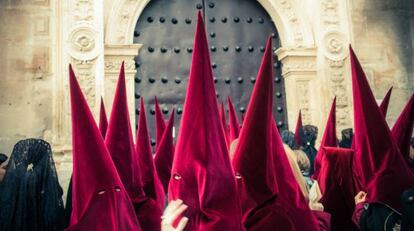“My God! These Spaniards are crazy”
What do visitors from Europe, Japan and Africa make of Spain’s religious holidays?

Sun, bullfighting, paella and of course the siesta.... Those are just a few of the more persistent stereotypes foreigners still associate with Spain, but according to the latest survey compiled by the Madrid-based Instituto Elcano thinktank, that list now includes la crisis.
Paradoxically, despite Spain’s more than half-a-decade of economic woes, perceptions of the country in the rest of Europe, the Americas, Asia, and North Africa have improved. The survey poses questions such as: “What is the first thing that comes to mind when you think of Spain?”
But how about delving a little deeper, and asking what foreigners think, for example, of Holy Week in Spain. What would an American, a Dane, a Mexican, a Mozambican, or a Japanese have to say about a procession of hooded penitents? While it’s not possible to reach any firm conclusions from such a small sample, we can confirm that in general, foreigners see Holy Week as mysterious, and in some cases, scary.
A mixture of emotion and rejection
“The first time I saw a Holy Week procession I felt a mixture of rejection and emotion,” says Pia Davidsen, a 50-year-old Dane who has been living in Plana Novella, a quiet town about half-an-hour’s drive from Barcelona, for the last 20 years. “Rejection because it seemed a sinister spectacle, something belonging to the past, and emotion because I could see that people embraced it totally.”
Maura Quatorze, a 34-year-old manager from Maputo, the capital of Mozambique, says the first time she saw a religious procession in Spain she wondered if she had “traveled back in time several centuries.” Nevertheless, she admits that the ceremony was “impressive, very carefully done, and very beautiful visually.”
Greg Mandel, who has traveled from Alaska to spend time traveling in Spain, said his first impression was “largely negative at seeing so many people dressed the same moving in unison amid such an intense atmosphere.”
Vicky, writing from Massachusetts, wonders if the money spent on the processions might not be better employed on providing food for the hungry, for example. Magda, a 43-year-old Romanian working in Spain, shares the same view. “We have processions in my country as well, but they can’t be compared to Spain’s. They are more discreet, and above all they aren’t as opulent, or as expensive.”
Taking baroque to the streets: it doesn’t matter if you’re agnostic
María José Lance, a 32-year-old psychologist from Argentina who lives in Madrid, travels to Andalusia each Easter to see what she calls “baroque on the streets.” She says that despite being agnostic, she genuinely enjoys “the festive atmosphere of the event, which is mixed with the ferocious faith of many, and with wonderful music such as the saetas in Granada.”
Safaa, a 30-year-old from the southern Moroccan city of Kenatra, adds: “It’s very positive that a group of people, or an entire village get together to do something nice.” But where Safaa sees devotion, Yuka, a 29-year-old Japanese translator, sees only fear. “I was very afraid, not to say panicked, when I saw the statues of Christ covered in blood.”
Helena Costa, a 34-year-old from Lisbon, Portugal, was also frightened when she first saw a religious procession at Easter in Spain. “Political or religious fanaticism scares me,” she says. “But this isn’t fanaticism,” says Soraya Infante, a 40-year-old Colombian who calls for more religious tolerance. “Particularly at a time like Holy Week.”
Luis Alberto López, a television producer from Mexico, and a Catholic on his mother’s side, says he is torn between incredulity and confusion when asked how he feels about the processions of Holy Week: “It’s a strange, contradictory feeling. Sometimes there are violent aspects to the celebrations [some penitents whip themselves or crawl on their knees during the processions], which to me seem to contradict the values of Holy Week.”
One thing that all those interviewed agreed on is that torrijas, a typical Easter dish of sliced bread soaked in milk, honey, or wine, are delicious. Happy Holy Week wherever you’re from.
Tu suscripción se está usando en otro dispositivo
¿Quieres añadir otro usuario a tu suscripción?
Si continúas leyendo en este dispositivo, no se podrá leer en el otro.
FlechaTu suscripción se está usando en otro dispositivo y solo puedes acceder a EL PAÍS desde un dispositivo a la vez.
Si quieres compartir tu cuenta, cambia tu suscripción a la modalidad Premium, así podrás añadir otro usuario. Cada uno accederá con su propia cuenta de email, lo que os permitirá personalizar vuestra experiencia en EL PAÍS.
¿Tienes una suscripción de empresa? Accede aquí para contratar más cuentas.
En el caso de no saber quién está usando tu cuenta, te recomendamos cambiar tu contraseña aquí.
Si decides continuar compartiendo tu cuenta, este mensaje se mostrará en tu dispositivo y en el de la otra persona que está usando tu cuenta de forma indefinida, afectando a tu experiencia de lectura. Puedes consultar aquí los términos y condiciones de la suscripción digital.








































